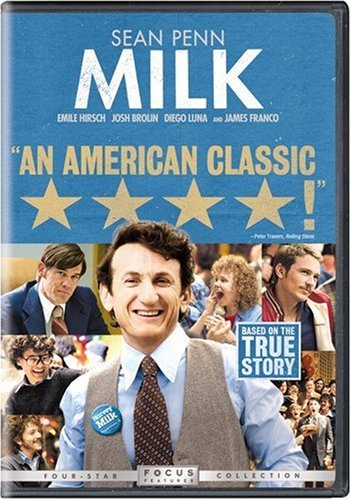All Nonfiction
- Bullying
- Books
- Academic
- Author Interviews
- Celebrity interviews
- College Articles
- College Essays
- Educator of the Year
- Heroes
- Interviews
- Memoir
- Personal Experience
- Sports
- Travel & Culture
All Opinions
- Bullying
- Current Events / Politics
- Discrimination
- Drugs / Alcohol / Smoking
- Entertainment / Celebrities
- Environment
- Love / Relationships
- Movies / Music / TV
- Pop Culture / Trends
- School / College
- Social Issues / Civics
- Spirituality / Religion
- Sports / Hobbies
All Hot Topics
- Bullying
- Community Service
- Environment
- Health
- Letters to the Editor
- Pride & Prejudice
- What Matters
- Back
Summer Guide
- Program Links
- Program Reviews
- Back
College Guide
- College Links
- College Reviews
- College Essays
- College Articles
- Back
Milk
Based on a true story, Harvey Milk (Sean Penn) ran for a major public office as an openly gay citizen in one of the nation’s most intolerant times. Meeting the love of his life, Scott, in a public subway system, the two openly proud gay men immediately felt high chemistry.
Moving to San Francisco in hopes of finding a society more accepting of their sexual preference, Harvey and Scott opened Castro Camera, a camera shop in the district of Castro. With a “welcoming” hello from the owner of the neighboring store, he brought the couple a threat of closure, which lead Harvey to the beginning of his gay activist career.
The district of Castro soon became the destination for homosexuals to live; hundreds came in weekly. Although “the police hated [the homosexuals], [they] hated them back.” Showing the courage and commitment for a group of people who are outcast to the human race, the ability to “tough it out” through the threats and the violence from police--whose job is to protect society from harm but who instead became the enemy simply for their sexual preference of others--expressed the frustration in society at that time and remaining today.
Harvey quickly organized Scott and a group of friends to support his desire to run for Supervisor of California; they made posters, flyers, and even attempted public speaking on a level which consisted of no funding. Running multiple times in hopes of gaining recognition, on January 9, 1978, Harvey finally became Supervisor of California.
Progressing from a gay activist to gay activist Supervisor, Harvey also helped the lives of many young gay men, giving advice as sort of a mentor. Knowing “there was blood literally running in the gutter,” Harvey never allowed his head to drop, for he carried a very optimistic and courageous demeanor.
Milk, a powerful production, expresses the hatred that homosexuals experience daily—believe it or not, even today. For some, they grasp the “luck” in having judgments behind their backs. Maybe luck does not exist, maybe there is no such thing as luck, but their success is in how they hold their confidence in a daily battle to keep their pride and dignity as an individual. If society were to live their own life, the “queers” would not quit. The daily torture from people, especially the unacceptance from some families wears the not only the inner soul, but the outer appearance as well. Face the facts, it is much easier to love than to hate.
In an attempt to initiate Proposition 6, a law that bans the rights of homosexuals, Harvey steps onto a thrilling roller coaster in attempt for no personal gain, but for everyone--“the gays, the blacks, the Asians, and the seniors, and the disabled, the uses. Without hope, the uses give up and I know you can’t live on hope alone, but without hope, life is not worth living.”
Similar Articles
JOIN THE DISCUSSION
This article has 0 comments.

